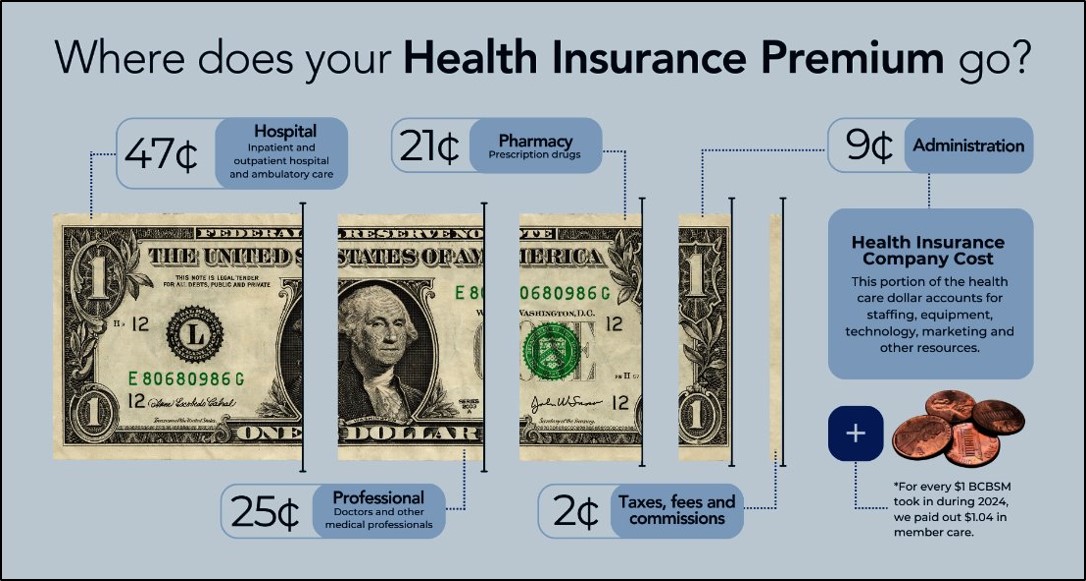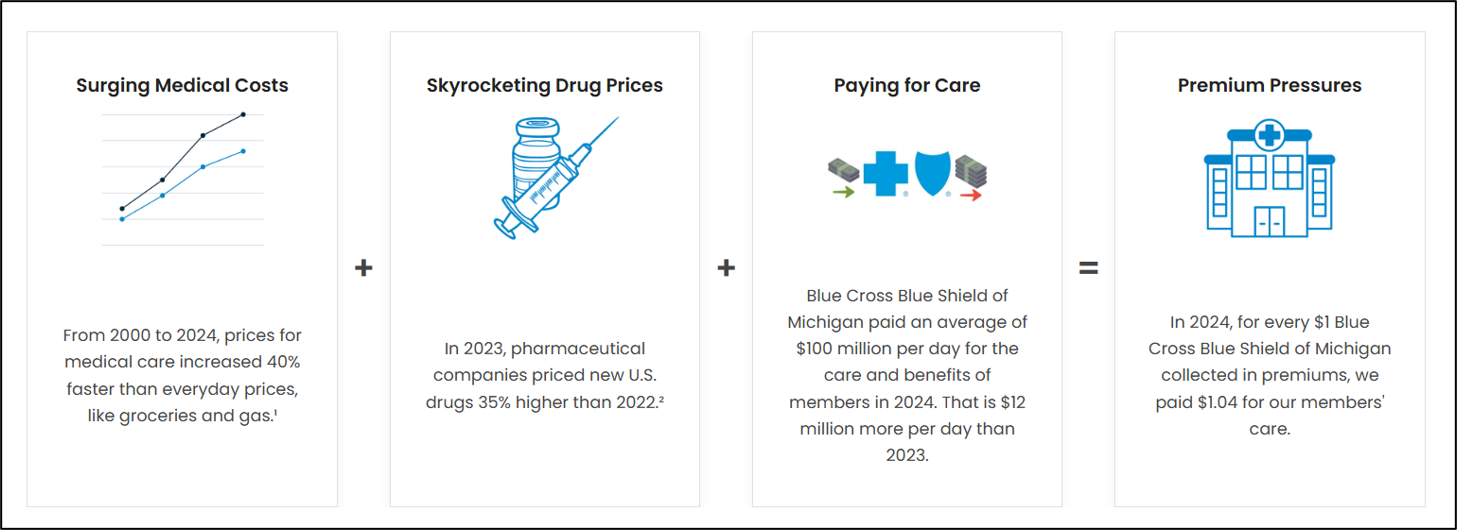Health Care Cost Challenges and Affordability: A Call for Systemwide Solutions
Oct 27, 2025, 13:47
by
Blue Cross Blue Shield of Michigan
Increasing health insurance costs are straining the budgets of individuals, families and employers. Blue Cross Blue Shield of Michigan is raising awareness about the systemic cost drivers that affect insurance rates and how the organization is working toward solutions to make health care more affordable and sustainable.
 From boardrooms to backyard barbecues, health care costs have reached a level that’s creating conversation everywhere. These costs are reshaping priorities at companies large and small, and impacting family budgets across our state and beyond. In 2024, the average per-employee cost of employer-sponsored health insurance climbed to $16,501, while national health care spending now consumes 18% of the nation’s GDP. These numbers point to more than rising expenses; they show a system experiencing an affordability epidemic.
From boardrooms to backyard barbecues, health care costs have reached a level that’s creating conversation everywhere. These costs are reshaping priorities at companies large and small, and impacting family budgets across our state and beyond. In 2024, the average per-employee cost of employer-sponsored health insurance climbed to $16,501, while national health care spending now consumes 18% of the nation’s GDP. These numbers point to more than rising expenses; they show a system experiencing an affordability epidemic.
The Health Insurance ‘Cost Equation’
At the center of the affordability challenge is what we call the “cost equation.” Health insurance reflects costs that originate upstream — hospital and physician charges, plus prescription drug pricing, plus our own administration, which all add up to premiums, leaving individuals and employers with little room to maneuver.
For Blue Cross Blue Shield of Michigan, the cost equation is a central focus, and those costs have continued to skyrocket. Consider:
- From 2000–2024, prices for medical care increased 40% faster than everyday goods like groceries and gas — up 250% since 2000.
- In 2023, pharmaceutical companies priced new U.S. drugs 35% higher than in 2022, adding increasing pressure to budgets.
- In 2024, BCBSM paid an average of $100 million per day for the care and benefits of members. That’s $12 million more per day than the year before.
- In 2024, for every $1 BCBSM collected in premiums, we paid $1.04 for our members’ care. That’s not sustainable for our company, or our customers.
Where Your Premium Dollar Goes

More than 90 cents of every dollar collected in premiums goes directly to medical and pharmacy claims. Just 9 cents covers administration. Understanding this breakdown helps highlight why controlling costs across the system is so critical, especially as demand for care continues to rise throughout the industry — in primary care offices, emergency rooms, telehealth visits and chronic disease management.
The bottom line is Blue Cross is paying out more in claims than we are charging our group customers and members in premiums, so these losses will continue to have a downstream impact on health insurance costs. When premiums rise faster than household incomes, it risks putting coverage out of reach for many.
How BCBSM is Responding
At BCBSM, we are taking action:
- We launched mibluedaily.com/affordability to provide a clear view of how health care dollars are spent, a necessary step toward meaningful reform.
- We’re reducing our own administrative costs by $600 million over three years, including $300 million to date in 2025.
- Our pharmacy initiatives — such as Price Edge, which helps our members find the lowest price on generic medications, and Evio Pharmacy Solutions — are designed to improve access to lower-cost medications while maintaining quality.
- We’re partnering with providers and hospitals to expand our Value Partnerships program, which has delivered Michigan consumers over $6.3 billion in savings since 2005, by shifting the focus from quantity of services to quality of patient outcomes.
Staying Focused on What Matters
The affordability crisis is one of the most urgent challenges in health care today. We are firmly focused on partnering to find solutions to the affordability equation, because we believe the health care system works best when we work together.
At Blue Cross Blue Shield of Michigan, we are committed to leading with transparency and discipline, making health care more affordable and sustainable for the people who count on us every day.
For more information, read more here: bcbsm.mibluedaily.com/affordability
Tricia A. Keith is president and CEO of Blue Cross Blue Shield of Michigan, which serves 4.7 million health insurance members across the country.

Health Care Cost Challenges and Affordability: A Call for Systemwide Solutions
Blue Cross Blue Shield of Michigan | Oct 27, 2025
 From boardrooms to backyard barbecues, health care costs have reached a level that’s creating conversation everywhere. These costs are reshaping priorities at companies large and small, and impacting family budgets across our state and beyond. In 2024, the average per-employee cost of employer-sponsored health insurance climbed to $16,501, while national health care spending now consumes 18% of the nation’s GDP. These numbers point to more than rising expenses; they show a system experiencing an affordability epidemic.
From boardrooms to backyard barbecues, health care costs have reached a level that’s creating conversation everywhere. These costs are reshaping priorities at companies large and small, and impacting family budgets across our state and beyond. In 2024, the average per-employee cost of employer-sponsored health insurance climbed to $16,501, while national health care spending now consumes 18% of the nation’s GDP. These numbers point to more than rising expenses; they show a system experiencing an affordability epidemic.
The Health Insurance ‘Cost Equation’
At the center of the affordability challenge is what we call the “cost equation.” Health insurance reflects costs that originate upstream — hospital and physician charges, plus prescription drug pricing, plus our own administration, which all add up to premiums, leaving individuals and employers with little room to maneuver.
For Blue Cross Blue Shield of Michigan, the cost equation is a central focus, and those costs have continued to skyrocket. Consider:
- From 2000–2024, prices for medical care increased 40% faster than everyday goods like groceries and gas — up 250% since 2000.
- In 2023, pharmaceutical companies priced new U.S. drugs 35% higher than in 2022, adding increasing pressure to budgets.
- In 2024, BCBSM paid an average of $100 million per day for the care and benefits of members. That’s $12 million more per day than the year before.
- In 2024, for every $1 BCBSM collected in premiums, we paid $1.04 for our members’ care. That’s not sustainable for our company, or our customers.
Where Your Premium Dollar Goes

More than 90 cents of every dollar collected in premiums goes directly to medical and pharmacy claims. Just 9 cents covers administration. Understanding this breakdown helps highlight why controlling costs across the system is so critical, especially as demand for care continues to rise throughout the industry — in primary care offices, emergency rooms, telehealth visits and chronic disease management.
The bottom line is Blue Cross is paying out more in claims than we are charging our group customers and members in premiums, so these losses will continue to have a downstream impact on health insurance costs. When premiums rise faster than household incomes, it risks putting coverage out of reach for many.
How BCBSM is Responding
At BCBSM, we are taking action:
- We launched mibluedaily.com/affordability to provide a clear view of how health care dollars are spent, a necessary step toward meaningful reform.
- We’re reducing our own administrative costs by $600 million over three years, including $300 million to date in 2025.
- Our pharmacy initiatives — such as Price Edge, which helps our members find the lowest price on generic medications, and Evio Pharmacy Solutions — are designed to improve access to lower-cost medications while maintaining quality.
- We’re partnering with providers and hospitals to expand our Value Partnerships program, which has delivered Michigan consumers over $6.3 billion in savings since 2005, by shifting the focus from quantity of services to quality of patient outcomes.
Staying Focused on What Matters
The affordability crisis is one of the most urgent challenges in health care today. We are firmly focused on partnering to find solutions to the affordability equation, because we believe the health care system works best when we work together.
At Blue Cross Blue Shield of Michigan, we are committed to leading with transparency and discipline, making health care more affordable and sustainable for the people who count on us every day.
For more information, read more here: bcbsm.mibluedaily.com/affordability
Tricia A. Keith is president and CEO of Blue Cross Blue Shield of Michigan, which serves 4.7 million health insurance members across the country.
 From boardrooms to backyard barbecues, health care costs have reached a level that’s creating conversation everywhere. These costs are reshaping priorities at companies large and small, and impacting family budgets across our state and beyond. In 2024, the average per-employee cost of employer-sponsored health insurance climbed to $16,501, while national health care spending now consumes 18% of the nation’s GDP. These numbers point to more than rising expenses; they show a system experiencing an affordability epidemic.
From boardrooms to backyard barbecues, health care costs have reached a level that’s creating conversation everywhere. These costs are reshaping priorities at companies large and small, and impacting family budgets across our state and beyond. In 2024, the average per-employee cost of employer-sponsored health insurance climbed to $16,501, while national health care spending now consumes 18% of the nation’s GDP. These numbers point to more than rising expenses; they show a system experiencing an affordability epidemic.



